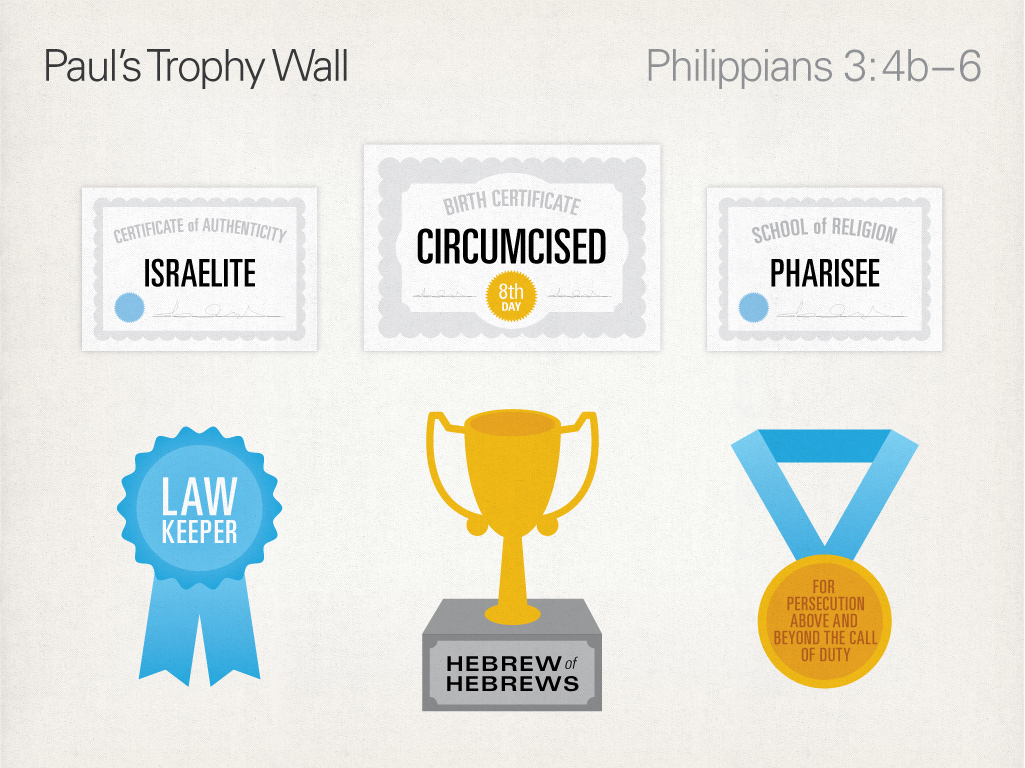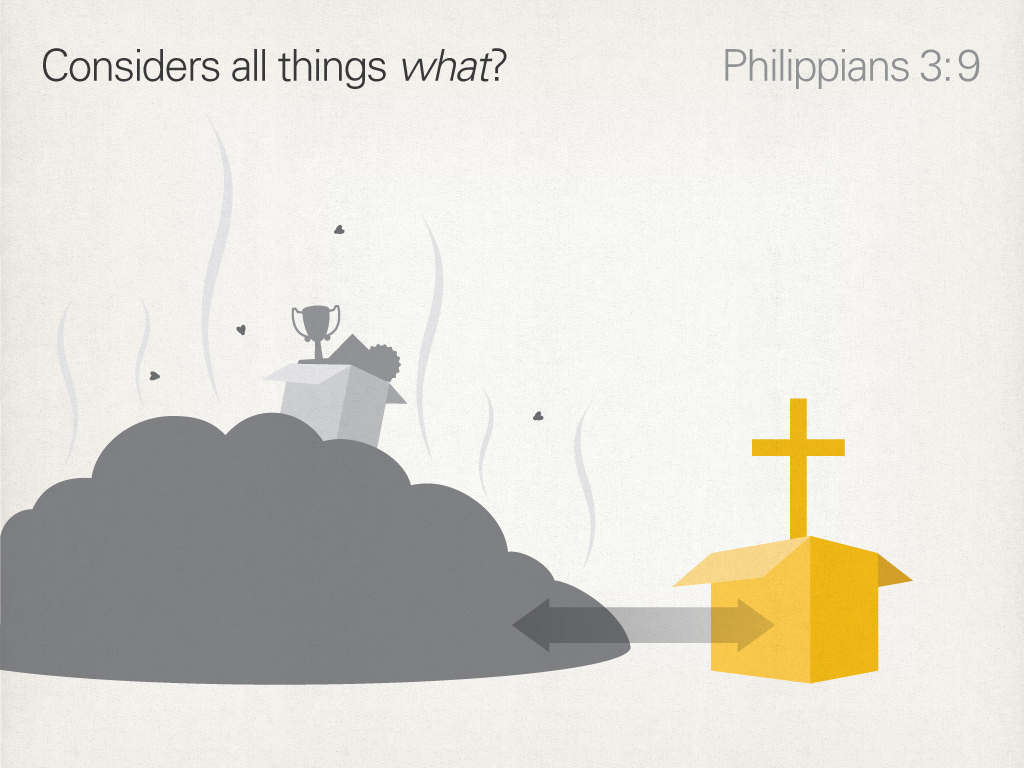All Things A Loss Compared to Jesus
Today's passage is such a very, very important passage in the life of a Christian. I'm going to be quoting a lot again from Steve Runge's "High Definition Commentary on Philippians" because I think he does an excellent job of getting to the point of what Paul is saying here and to the point of our lives as Christians. All graphics also come from the commentary. I know this is a long post with a lot of quoting in it, but it is ABSOLUTELY worth the read as Runge explains this passage out. You will not be sorry that you took the time to read it. Now, on to the passage.
First some context: Paul is dealing with the "Judaizers" again - people that are telling Christians that they have to be good Jews in order to to be good Christians. To put the issue in perspective, Paul talks about HIS credentials, which are excellent. He's doing some "boasting" like he did to the Corinthians, but as the chapter moves on he uses those credentials to make a very, very important point that we ALL need to understand:
"What trophies and accolades does he have hanging on his wall, figuratively speaking? Heritage, schooling, zealous exploits—he’s got it all. He was circumcised on the eighth day, just as specified in Leviticus 12:3—a full-blooded Israelite even though he hailed from Tarsus. And he’s not just any Israelite. He’s from the tribe of one of Jacob’s two most-favored sons: Benjamin. As far as religious education, his reference to being a Pharisee implies adherence to a strict interpretation of the Torah according to their customs. His statement about persecuting the church makes him a bona fide Pharisee. His connection to Pharisaism was more than casual; it singularly directed his actions. His lifestyle also bore out his commitment to living a righteous life. Paul is not talking here about a works-based righteousness but a life characterized by strict obedience to the Pharisaic code; he lived it out blamelessly...
In the first stage, he essentially says, “You want to know how committed I am to Christ, how important He is to me? You see all these things I just listed, all the things on my trophy wall? I’m willing to write off all these things for the sake of Christ.” These are the things that would have given Paul respect, honor, and influence in his culture, yet he’s willing to disavow them in exchange for knowing Christ.
What are the things that you have on your trophy wall? For me, it would be my graduate degrees, publications, how smart and wonderful my kids are, my lovely wife (the most gracious hostess you’re ever going to meet), and my ability to build or fix things. All of these things in one way or another can build my ego; they’re things that I can beat my chest about and say, “Hey, look at me!” What’s interesting about Paul’s trophies is that half of them were completely beyond his control: being an Israelite of Benjamin and an eighth-day circumcision. These were sovereignly bestowed!
So what exactly does Paul mean when he counts these things as loss? If I want to be like Paul, do I need to burn my degrees, stopping using my building knowledge, and be ashamed of my family? No. As we look at the account of his life in Acts, we never see him pretending that he was not an influential, well-connected Jew and a Roman citizen. We regularly see him utilizing his knowledge of the Law, Pharisaism, and his Jewish heritage. He used any advantage he could to further the gospel. What he is talking about here is where he finds his identity. He is honing in on a million-dollar question: where do we place our value—what parts of our life in the flesh do we boast about? The answer should be “none.” These are all valuable things, but they are to be used as gifts from God for His purposes working through us.
What does this mean for me? [Whatever I'm good at], I should not use these things to boost my ego. They should not define who I am. Think about the change in attitude that comes about when this happens. Instead of things to cling onto, all these valuable things are resources to be laid at the Lord’s feet to be used for His good pleasure. In finding my identity in Christ, these other things do not cease to exist; they simply no longer define who I am. It’s a process, not an event. Paul stresses this in 3:12–14. But it all begins by taking those things that we hold dear and no longer finding our identity in them. This is what Paul means by taking his valued trophies and counting them loss.
This sounds like an impressive sacrifice, and it is! By giving up his most treasured things, Paul makes a relationship with Christ sound valuable. But this is just the beginning! It’s time for stage two. Paul raises the bar in 3:8 by saying he’s willing to give up even more: everything! It’s not just his trophies and accomplishments that he’s willing to count as loss; he’s willing to give it all! We’re talking about everything here, not just his influence and education. He would even be willing to give his life. This is how he can say in 1:21 that to live is Christ and to die is gain. It isn’t his life anymore. Knowing Christ and being found in Him is worth more than anything and worth giving everything. Jim Elliot echoed this sentiment when he said, “He is no fool who gives what he cannot keep to gain that which he cannot lose.” This is exactly the kind of value system that Paul describes here in Philippians 3.
A quick note: in this last section, Runge is referring to verse 8, which says "...and count them as rubbish..." (ESV). Other translations phrase it differently, but probably the closest is the KJV with "dung". The Greek work here is a relatively crass word for what we put in the toilet, and Paul uses such a crass word for a reason. Let's continue reading:
"Now for stage three. Paul ratchets things up one more notch in the last half of 3:8. This time he makes us a little uncomfortable. When we have something of value in our culture, say a house or a car, we typically insure it against loss from fire, theft, or various kinds of destruction. We do this because we want protection against loss. When Paul says that he counts all things loss, he is still treating them as valuable. He is simply making the decision not to hang onto these valuable things, but to exchange them for Christ. In this last stage, all this changes.
Paul is about to talk about the things we deposit in toilets. Most of us today have toilets in our homes, workplaces, and pretty much any public place. All the toilets are connected to soil pipes that take away the things that have been deposited there. Where? Nobody really cares where, so long as it is gone. Why aren’t we sad when we flush the toilet? Because we have absolutely no interest in keeping what is deposited there! We pay utility companies to take it.
Instead of Paul considering all his stuff as “valuable, but worth the trade” for knowing Christ, Paul goes one step further. Knowing Christ is so valuable to him that, in comparison, he considers his stuff to be about as desirable as feces.
This is an EXTREMELY vivid picture of what it means to follow Jesus. The thing I love about Paul's writing here is that he doesn't portray this "loss" as I duty. It's not "If I HAVE to give these things up for Jesus, I guess I will." Paul writes that he takes JOY in doing so because NOTHING is worth comparing to knowing Jesus. Nothing. It's easy to forget that sometimes - we fall into lives of duty and think about the cost of being a Christian, but forget about the joy of knowing Jesus and loving Him. May God always bring us back to this passage if we do so.
Thoughts? Questions? Comments?


 RSS Feed
RSS Feed
